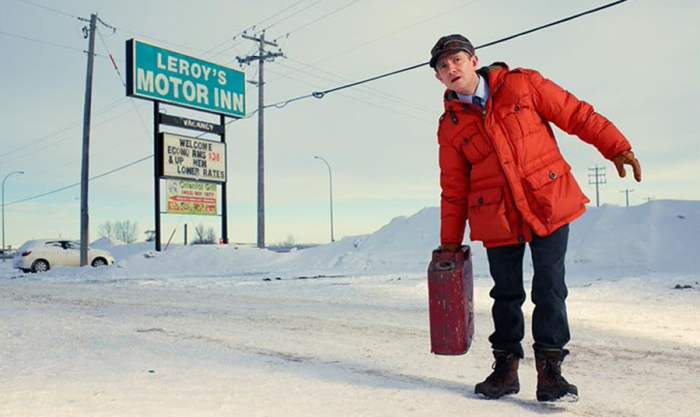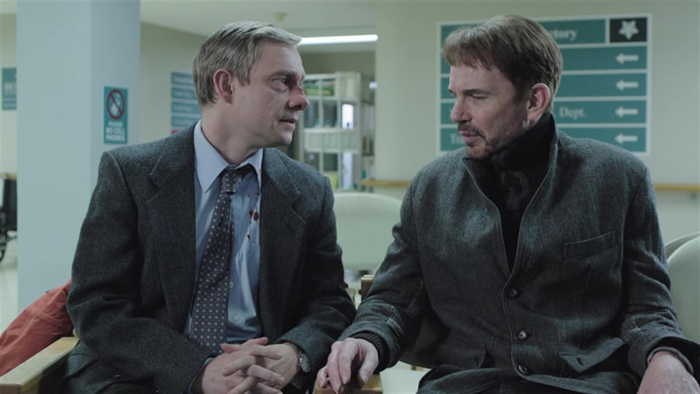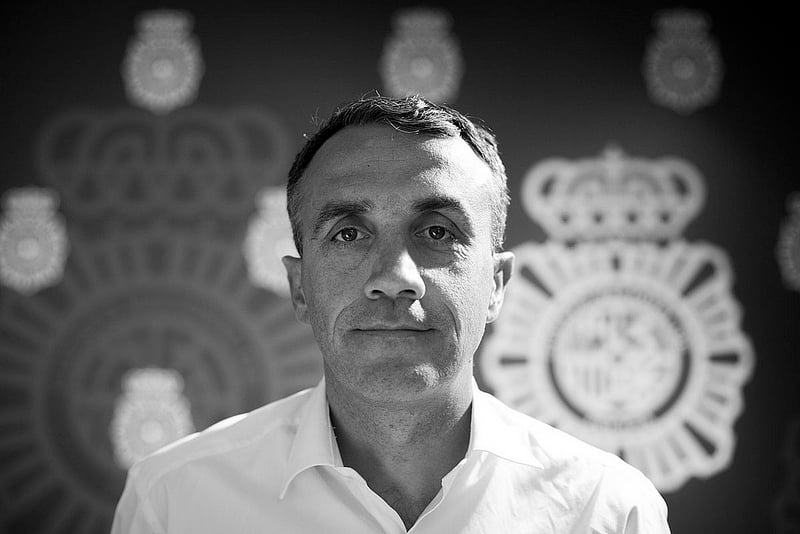
Carlos Fernández Guerra (Madrid, 1974) es responsable de redes sociales de la Policía Nacional. Se define como un hombre de comunicación. No es policía ni es funcionario. Dice saber poco de tecnología, de seguridad y de leyes. Conoce a fondo la red, a la que está todo el día conectado. Con una trayectoria de periodista en comunicación empresarial e institucional, empezó en la policía por casualidad, con un proyecto para la implantación del DNI electrónico. Define el trabajo de @policia —detrás del cual está el gabinete de prensa, formado por ocho policías licenciados en diferentes carreras de Humanidades que orienta a Carlos en cuestiones policiales y legales— como muy esclavo, siempre pegado a la actualidad y con el objetivo primordial de ser útil.
A raíz del asesinato de Isabel Carrasco el ministro de Interior anunció una operación conjunta de policía y guardia civil para rastrear comentarios en Twitter y ya se han producido varias detenciones. Se ha recuperado un tuit de la policía a propósito de este tema que lleva más de seis mil retuits:
“¡Ojalá se mueran (o una bomba)…” es una mezquindad, una idiotez, pero NO ES DELITO ¿Por qué no les ignoras y bloqueas? Te cabrearás menos
— Policía Nacional (@policia) junio 30, 2013
Supongo que al publicar este consejo contabas con asesoramiento legal. ¿Ha cambiado algo desde entonces?
Es que hay muchas cuestiones que paradójicamente no son contradictorias.
¿Mantienes ese tuit?
Absolutamente. Cien por cien. El desear que te mueras es mezquino y miserable, pero no es delito. Hay otras cuestiones que sí lo son: las injurias, los ataques contra la intimidad o el honor. Los artículos que están saliendo estos días del Código Penal, como el 510, están plenamente vigentes. Ya ocurrió con Cristina Cifuentes, entonces tuvimos que decir que desear la muerte es muy mezquino. Creo que como tuiteros debemos avergonzarnos de esa gente y sobre todo de que se les retuitee, porque no son más que meros troles, y se habla tanto de ellos que parece que todos los tuiteros son así. El Código Penal tiene absoluta vigencia. No debemos confundir, para considerarse amenazas siempre hablo de cuatro condiciones: tienen que ser claras, graves, directas y creíbles. Ahora bien, delitos contra el honor hay muchos: la injuria, contra la intimidad… el Código Penal lo deja clarísimo.
¿Crees que el Código Penal vigente contempla los delitos que se pueden producir en las redes?
Yo, que no soy experto en leyes ni pretendo serlo, creo que es imprescindible que la justicia actúe inmediatamente y que a lo mejor nos tenemos que adaptar porque el Código Penal se ha quedado corto. Si el que difundió el video de Olvido Hormigos se ha ido de rositas, está claro que eso hay que mejorarlo. No obstante, no olvidemos que hay muchas cuestiones que el Código Penal encierra suficientemente. ¿Se puede mejorar? Sí. ¿La realidad social siempre va por delante de la ley? Sí. De hecho las leyes se hacen para afrontar estas realidades.
No solo como responsable de la cuenta de @policía, sino como tuitero, ¿crees que la imagen de caldo de cultivo de la violencia y el odio se corresponde con la realidad?
En absoluto. En primer lugar el problema lo tenemos los tuiteros. Yo lo soy, aunque desgraciadamente me puedo dedicar menos de lo que quisiera a leer, a disfrutar de Twitter como espectador en mi cuenta personal. Hemos dado demasiada bola a esa chusma —que no sé si son delincuentes o no ni es mi problema— aunque sea para decir que nos dan asco. A lo mejor no teníamos que haber hablado de ellos. Tenemos muchos ejemplos en los que hemos hecho mal entrando al trapo de troles. Como el ejemplo de «Mueren Pocas», que es un perfil muy conocido. Son troles que pisan la ley para frivolizar con la violencia de género. Es un juego de enfermos sociales. La gente se lo envía a los influencers, como los llaman ahora, y lo que hacen ellos es dar una publicidad brutal. Cuando se produce el asesinato de Isabel Carrasco de repente se lía la mundial. Se producen dos fenómenos: por un lado todo el mundo intentando dar información inmediatamente y por otro los mensajes poco afortunados, crueles, miserables y alguno que supuestamente puede ser delictivo o atentar contra el honor.

Un usuario de Twitter, siendo una red selectiva, no percibe esa supuesta oleada de mensajes si no lo ha elegido.
No, el problema es que muchos de nosotros cometemos el error de que para despreciar a alguien lo retuiteamos y entonces le damos publicidad. En el tema de pornografía infantil se está intentando educar a la gente desde este grupo de redes sociales para que no se retuiteen perfiles de este tipo. Pues esto es exactamente igual, en primer lugar, si tú sigues a este perfil, háztelo mirar. Pero, ojo, recordemos, el 99,9 por ciento de los tuiteros somos gente normal.
De hecho, colaboran para combatir el crimen según se afirma desde la policía.
Colaboran de una forma impresionante. No solamente eso, yo creo que somos una élite respecto a los que no lo son —permíteme ser así de cretino y egocéntrico como tuitero—, siempre he pensado que estamos por encima de la media en distintas cuestiones.
Tampoco parece lógico considerar especial a la gente que utiliza internet, tal vez Twitter sí es más minoritario, pero la mayoría de la población usa la red.
Me encantaría que fuera así y que también se tuviera en cuenta quién usa internet y para qué. En el fondo nos parecemos muchos menos de lo que parece. Yo no me bajo música, básicamente porque ya no me acuerdo. Cada uno utiliza internet de una manera y eso nos define. Desgraciadamente lo uso en el noventa por ciento por el tema laboral, lo hago también como periodista porque me gusta leer. Twitter lo utilizamos para cosas superdivertidas la mayoría de la gente y luego hay núcleos muy obsesos, déjame emplear esta palabra. Las redes sociales tienen, al igual que tenían antes los foros, un elemento cohesionador, radicalizador. Yo no estoy en uno de ellos pero desgraciadamente observo la reacción y en este caso ha sido de mal gusto y sobre todo muy exagerada, muy publicitada por todos…
A eso iba. De un tuitero de seiscientos seguidores, que tú sabrás calcular la repercusión que puede tener, se han publicado tuits traducidos al castellano en varios diarios y en televisión. Dado que uno de los requisitos de estos presuntos delitos es la publicidad, ¿no es un tanto contradictorio?
Con los troles hay que jugar con inteligencia. No puedes premiarlos. Yo hablo con muchos periodistas amenazados, injuriados, y les pido por favor que no premien al trol, porque le estás dando una fama que no merece. Hay que hacer una comunicación inteligente, pero también te digo que a veces hay que dar un aviso a navegantes.
Esta repercusión no se ha producido por Twitter, sino por la prensa y los cuerpos de seguridad que han facilitado esos datos.
Sí, pero creo que es útil decir «ojito». El aviso a navegantes es muy bueno.
Entonces, ¿es una operación de advertencia?
No, no; el aviso a navegantes de que no todo sale gratis, de que no eres impune. Es muy importante concienciar a la gente de que tienes que responsabilizarte de lo que cuelgues en internet. Hay gente que cree que dejas algo en internet y no pasa nada. Es más bien al contrario: dejas una huella impresionante. En la calle yo te puedo decir cualquier cosa con la grabadora apagada y es tu palabra contra la mía; en internet, no. Creo que es muy importante y muy positivo concienciar a la gente. Estamos formando a la gente en un ámbito relativamente nuevo. La injuria, con la publicidad que le hemos dado todos los medios, igual no es tan buena porque si yo fuera familiar pensaría, ¿tanto la odiaban? Y eso es mentira.

Algunos de esos tuits tal vez no habrían llegado a la familia. Ahora sí, y además van a quedar en las hemerotecas para siempre.
Sí, pero a veces hemos sido todos muy ingenuos. Te pongo los ejemplos de «Mueren Pocas», de anorexia y bulimia que hay gente que frivoliza, pornografía infantil y demás. Al final el efecto Streisand, que llamamos en comunicación, apareció absolutamente. Hay una serie de tuis en que las unidades operativas de uno de los dos cuerpos de seguridad, policía y guardia civil, están investigando si hay delito o no. Ahí está el Código Penal.
¿Tú crees que va a quedar en eso, en algo ejemplarizante, o es abarcable hacer una persecución de este tipo de delitos en la red?
Creo que es fundamental que se persigan. Que la injuria no salga gratis…
Pero eso no se puede investigar de oficio. Me refiero a como se ha hecho ahora, ¿es abarcable investigar mensajes violentos no solo a políticos…?
Créeme que los profesionales, y yo conozco a varios, que trabajan en estos temas son muy rigurosos y no van a cometer ninguna idiotez y solamente se limitarían al Código Penal. Además luego está el juez. Creo que podemos estar seguros de la profesionalidad de los distintos agentes e instructores que se encargan de este ámbito que algunos dicen que es muy nuevo pero no lo es tanto, porque poco a poco nos vamos sumando todos. De repente nos encontramos casos que nadie esperaba, hace dos años del caso de Olvido Hormigos que a todos nos indignó, a pesar de que muchos veíamos que esa publicidad no era casual, el derecho sigue ahí y si la gente sale de rositas algo está mal en el Código Penal. En estos casos de injurias, injurias agravadas, delitos contra el honor… hay un montón de cuestiones que el Código Penal persigue y de hecho se imputa por algo, no porque hayas puesto un tuit muy malo.
Me refería a que, como sabes, se han señalado muchos casos similares, incluso algunos denunciados, y si se va a iniciar con esto una campaña para perseguir todos.
Yo siempre pido a la gente: por favor, denuncia. Siempre hablo de tres cuestiones: por un lado, ignora. Seas o no seas famoso. A veces no hay forma de acceder al famoso, antes había un mail, si lo encontrabas, al que dirigirte y/o un foro en el que protestar y el famoso no se iba a enterar. Lo segundo: bloquea. Porque normalmente si eres un político no lo llevas tú, te lo lleva alguien que bosteza cuando recibe un tuit ofensivo o amenazante; pero si eres un periodista, sí. Entonces no le retuitees, porque le animas porque ha sido capaz de joder a «este facha, rojo, madridista, barcelonista…» —que sepas que son mucho más radicales y descerebrados en el tema deportivo que en el tema político—. Tercero: si hay algún posible delito, denuncia.
Has mencionado varias veces a Olvido Hormigos y he observado que los tuits que se envían desde la cuenta de @policía sobre este tema suelen orientarse a no compartir tu intimidad, y esto no es delito.
No, eso es ser inteligente en el uso de las redes sociales y las nuevas tecnologías.
Pero siempre van dirigidos a la víctima, ¿no hay un trasfondo de criminalizar a la víctima?
No, no, no. Es para evitarle problemas. Porque luego a lo mejor no va a haber delito. O no va a ser nada fácil. Las nuevas tecnologías cambian continuamente y hay plataformas difíciles de rastrear. Hay una red que no es social, que es grupal y que es potentísima pero es peligrosísima. Yo abomino de los grupos de padres, habría que dinamitarlos por ley, porque son capaces de pasar bulos de todo tipo.

Has hecho apología de la violencia…
Es tremendo, créeme, la capacidad que tienen para viralizar todo tipo de bulos. También hay un problemón con el acoso escolar. Nosotros hemos hecho una campaña y hablamos de una problemática que no llega ni a la comisaría: el grupo de WhatsApp que hacen los niños de la clase; bien porque no te dejan entrar en él, que es una forma de acoso, bien porque suben un contenido tuyo. Y luego está el sexting. Practícalo bien, qué envidia, qué suerte… ahora bien, con cabeza; sobre todo en edades muy jóvenes.
Principalmente te diriges a un público…
A un público la mitad de descerebrado que yo.
Aparte de descerebrado… ¿de edad?
Me importa más el público de veinte años que el de treinta y cinco. Me dirijo a todos pero es más prioritario el de veinte o el de quince, porque ellos no tienen nuestra experiencia. Todos sabemos lo que pasa con los novios de los dieciocho años. Y también quiero avisar al novio de que lo va a pagar caro, el problema está en que esa chica no se debe dejar grabar. Hay tantos casos que, para que te hagas una idea, nosotros no lo contamos casi nunca. A mí son los que más me interesan, pero policialmente son tan irrelevantes que apenas lo contamos vía gabinete de prensa. Hay una serie de cuestiones en las que debemos formar a la gente. Los padres tienen que hacer un gran esfuerzo, porque los colegios y los cuerpos de seguridad hemos hecho un trabajo preventivo, pero los padres tienen que poner normas muy claras. Y luego, sobre todo los chicos que sepan ser persona —en mi época se diría «sé hombre» pero a lo mejor ahora no es políticamente correcto—, sé persona para que lo que pase se quede en la intimidad.
Esa estrategia que sigues para conectar con los jóvenes porque es el público primordial para ti, ¿no te pasa un coste al dirigirte en tono de buen rollo a los ciudadanos que estamos acostumbrados a que los agentes se dirijan a nosotros de otra forma?
Es un programa de formación, concienciación, prevención e información desde la Policía Nacional. Ahora bien, si quisiéramos hacer un BOE, la policía ya tiene la Orden General, que utiliza un lenguaje institucional; jurídico, si lo queremos llamar así. Pero queremos hacer algo útil, pagando una serie de peajes brutales. Todo por la utilidad, por saber a quién vamos a llegar, qué vamos a conseguir. Lo bueno de las redes sociales es que se pueden comprobar los resultados. Y no me refiero al número de seguidores, ojo, me refiero al respaldo, a la utilidad, a la concienciación, a ir a los colegios y recibir un apoyo masivo de los profesores. Que toda la sociedad sepa de qué estamos hablando, porque tenemos que concienciar a la gente de cosas tan absurdas pero tan relevantes como no presentar denuncias falsas. Son delitos que cómo vamos a hablar de ellos en una nota de prensa, se lo tenemos que explicar a la gente.
El éxito es indiscutible, no solo por los seguidores, sino por la repercusión. ¿Entre los miembros del cuerpo también se ve bien ese lenguaje de buen rollo?
Es que no es nuestro público objetivo. Ellos igual no lo entienden, me piden mayor representatividad, me piden otro lenguaje y que recuerde que «represento a». Yo les digo que tampoco quiero representar al cuerpo; no soy digno de ello, está clarísimo. No soy representante de la Dirección General de Policía ni del Cuerpo Nacional de Policía. Queremos lanzar una serie de mensajes que yo creo que son muy relevantes. Empezamos en Tuenti con el Plan Contigo, que fue un éxito brutal, y ahora lo hacemos con Twitter, con una viralización masiva, y Facebook. Y ellos tienen que entender que no va destinado a ellos, que hay una serie de objetivos —muy vinculados a la Dirección General de la Policía, eso es cierto— útiles y no queremos utilizar un lenguaje más propio de otro canal.

Publicas muchas acciones de los agentes en colegios y demás, pero cuando ha habido cargas en manifestaciones se opta por el silencio.
Yo he dado tres pasos al frente, ¿eh? El 22 de marzo subí el hashtag #22Mmarchasporladignidad. Pirendo (herramienta de medida de influencia en redes sociales) subió los dos tuits más vistos del 22M y los dio la Policía Nacional. Unos cuantos salvajes reventaron una manifestación de miles de personas pacíficas y yo lo quise contar por una razón muy importante: la gente debe saberlo, y yo tuve prisa por contarlo. En España fueron los dos tuits más influyentes o más vistos. Tenemos la tendencia de mirarnos mucho al ombligo y nos olvidamos de que hay otro país que es Venezuela. Curiosamente no logré ser el tuit más visto en todo el mundo porque en Venezuela me ganaron. Mis dos tuits sí estaban entre los veinte más vistos del mundo, pero eran los únicos españoles, todos los demás de Venezuela, donde estaban viviendo un momento del que apenas hablábamos. Hay gente que me dice que no me mojo, pues menos mal. Las imágenes salvajes de los cien o doscientos reventadores hablaban mucho más que yo. Frente a una concentración legítima. Y solo hemos hablado de ellos. No sé si sería su objetivo, pero solo hemos hablado de ellos. Ya no nos acordamos de por qué se convocó el 22M, qué pedían exactamente; solo hemos hablado de esas imágenes vergonzosas.
Cuando te invitan instituciones extranjeras a dar charlas de comunicación relacionadas con el éxito de @policia, ¿qué es en lo que más se fijan o por lo que más te preguntan?
Me preguntan mucho cómo lo gestionamos, quieren el secreto de la Coca-Cola. También si tengo libertad o no. Se interesan muchas veces, porque no dan crédito, por los grandes hits como el de Breaking Bad porque creen que son los más retuiteados, pero en realidad son los de utilidad como el del accidente de Santiago. Pero sobre todo me preguntan cómo se hace, creen que tengo dos o tres hojas de «así se hace» y que se las daría. Suelo contar cómo trabajo porque creo que no lo van a implantar. Muchos me dicen «es que nosotros somos una empresa seria». Claro, y nosotros no. No te confundas, eres una marca aburrida que no estás orientada al cliente, sino a contentar al consejo de administración. Muchas veces acabo discutiendo en plan provocación. Me encanta discutir de comunicación.
La mayoría de los tuiteros se dirigen a la cuenta de la policía por tu nombre y tú sueles firmar muchas respuestas, ¿crees que es conveniente en una cuenta institucional que se personalice tanto?
Creo que sí. Es más, creo que son todo ventajas frente a otras que no lo hacen. Es la única institución pública que lo hace así, privadas hay muchas, algunas por temas de responsabilidad. Yo creo que es fundamental, dado que soy un poco bocazas, que nadie dude de quién es el culpable. En segundo lugar, cuando llamas a un sitio y te atiende una operadora, te indica su nombre. También lo hacen ahora en atención al ciudadano. Tiene un sentido de compromiso y muchísimas ventajas, pero sobre todo para decir: el que no sabe expresarse es Carlos, no la policía; el que hace un guiño o una broma es el community manager, no la policía.
Ahora que te has hecho famoso como community, ¿has recibido otras ofertas?
Es que yo no soy solo community manager. También soy social media manager, social media strategist, también hago un montón de comunicación offline aquí. No escucharía ofertas para irme de la policía solo de community manager. Estoy en este proyecto, que tendrá final, aunque no sé cuándo, para mí. No me veo yéndome solo de community manager. Pero sí, visibilidad está claro que me da. Para lo bueno y para lo malo. Te atrae moscones, lo cual tampoco es maravilloso. Lo que no he logrado todavía es ligar gracias a ser community de la policía.
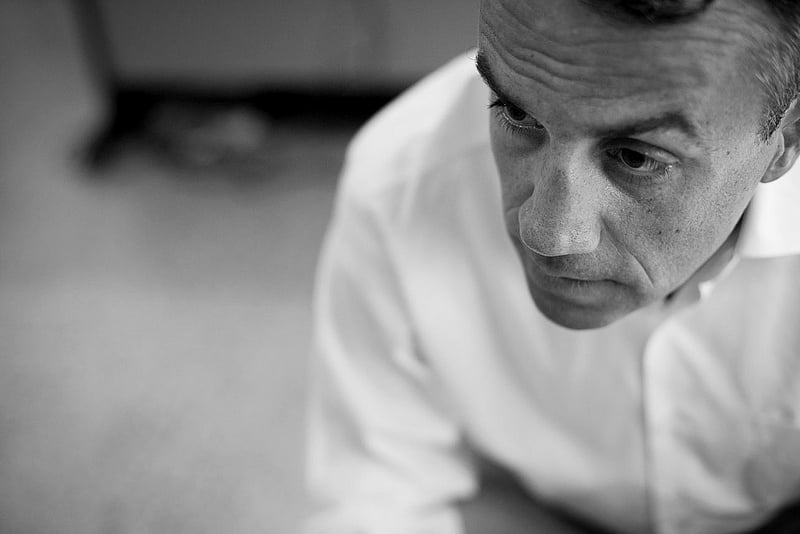
Conocerás la iniciativa de la policía de Nueva York para compartir imágenes de su relación con los agentes http://www.20minutos.es/noticia/2120878/0/miles-fotos/policias-violentos-ny/incendian-twitter/, ¿Si se te hubiera ocurrido a ti cómo la habrías valorado?
Se me ocurrió hace cuatro años y dije: no. Pensé que si jugamos sea poniendo yo las reglas del juego. Ahora bien, lo cierto es que se ha sacado todo de madre. ¿Por qué son tan exagerados? Es una anécdota. Es un consuelo ver que en Nueva York son tan sensacionalistas como nosotros. No saquemos las cosas de quicio. Aunque yo entiendo que es gracioso, como otras cosas que me han pasado a mí [ríe], y que a la gente le encantan porque son muy graciosas. Yo no lo hice porque siempre pienso qué recorrido pueden tener y siempre elijo iniciativas controlables. He hecho concursos donde se enviaban también cosas, pero no animaba a ese tipo de cuestiones porque pienso que hay otros canales mucho mejores que las redes sociales. Pero no es para abrir periódicos. El de la policía luego estaba tan contento. Yo no lo estaría. Hay que entender que los troles son como lo que ocurre en atención al cliente, donde nadie te va a llamar para decirte lo bien que lo haces.
Se ha desvirtuado mucho el concepto de trol, ahora es cualquiera que te critique.
No, no, no. En absoluto. Si hay algo que me preocupa es que mis seguidores me critiquen. Si tengo cinco o diez seguidores que me critican un tuit, créeme que pienso que algo no he hecho bien.
¿No es un poco estresante? Porque me he fijado que recibes listas de respuestas puntuando el ingenio del tuit como si fuera Eurovisión.
Hay gente muy paranoica que dice: «te han dado un toque, ¿verdad?» o «Devolvednos a Carlos». Es muy frustrante porque si consigues uno bueno al día siguiente quieres imitarlo y no lo consigues. Si consigues uno que le gusta a la gente, que a veces yo no entiendo ni por qué gusta tanto, quieres repetir y nada.
¿Cuál es la mayor satisfacción que te produce tu trabajo?
Ser útil. Si consigo que no se graben las mujeres, fíjate qué básico soy…
Pero si eso es lícito…
Sí es lícito, pero se van a arrepentir. El problema está en el exnovio amargado.
Pues dedícales un tuit a ellos.
También, e insistiré. Sobre todo como aviso a navegantes: no seas cobarde. En el acoso escolar y en este tipo de cuestiones. Sé persona y demuestra que respetas la intimidad.
¿Y lo peor de tu trabajo, lo que te amarga, qué es?
Cagarla. Por lo general cuando hay una crisis me cabrea. Lo del otro día me lo tomo con cierta filosofía, me molesta más como tuitero que como @policia. Ver que no podemos ayudar a gente que me encantaría ayudar: por ejemplo, me piden mucho que busquemos a desaparecidos y no podemos porque tenemos que medir mucho los recursos y los esfuerzos.
Guardia Civil sí lo hace.
Nosotros buscamos a fugitivos y siempre con protocolo judicial. Son distintos métodos. En enero buscamos a tres fugitivos muy peligrosos y aparecieron en horas. Sin los tuiteros y nuestros aliados los medios de comunicación no habría sido posible. Espero que el día que busquemos a alguien avises a los community managers de Jot Down, aunque lo hacemos muy poco precisamente para no cansar a la gente con peticiones continuas.

Te voy a hacer una pregunta para terminar porque nos ha surgido un problema en la redacción y quizás desde la policía nos puedas asesorar. ¿Para sacar un cadáver del país (UE) lo metemos en la maleta o le compramos un billete de avión?
[Ríe] Hombre… A ver sí voy a decir una burrada. Contrólate, Carlos. Cometo la torpeza de contestar demasiado, ¿por qué hablo tanto? Es muy importante no decir siempre lo que piensas y pensar mucho lo que dices. Hay errores brutales y torpes —porque yo no sabré de seguridad, no sabré de leyes, pero me dedico al lenguaje y no puedo equivocarme en eso—. La gran suerte es que todo el mundo sabía que era yo el que había contestado. Encima no me di cuenta, no veía lo que había puesto hasta que vino lo mejor de cada casa a felicitarme. Me sentí como si de repente todo el Bernabéu aplaude a Messi y pensé «algo va mal».
¿Cuando leíste «Carlos, eres un crack» unas quinientas veces?
Al trescientos me di cuenta. Pero vamos a ubicarnos: es una anécdota. Dio la vuelta al mundo, eso sí.
Y aumentaron los seguidores.
Muchos de los que lo retuitearon tienen todavía el freno social de seguir a la policía, algo que en cualquier otro país es normal. En segundo lugar, si me siguen solo por eso, me van a dejar de seguir. Y, por último, a mí no me sirve de nada tener más seguidores si no es con un fin de utilidad. Lo que demuestra es el poder de las redes sociales, de repente la fastidias y un contenido que no tiene encaje en medios serios se difunde y lo recogen medios de otras partes de mundo porque da audiencia ver cómo un imbécil ha metido la pata. He cometido varias torpezas, lo que pasa es que esa… cuando llegó a los cuatro o cinco mil tuits que me estaban llegando en ese mismo día, me centré en mi cuenta personal porque en la otra era imposible. Lo peor es que al final me afecta, al político tú le puedes decir cualquier barbaridad en redes sociales que no se va a enterar, se enterará si sale en la televisión. Yo en cambio no puedo permitirme el lujo de tomar esa distancia. Tres o cuatros días dormí mal, lo sobredimensionas. A la semana ya sonríes.

Fotografía: Guadalupe de la Vallina
















































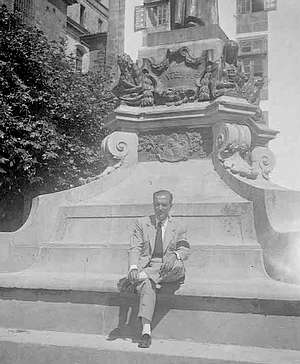




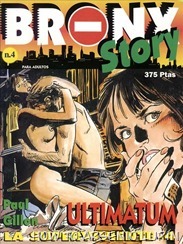
 TBS is getting rid of its newest late night program. The cable network has canceled The Pete Holmes Show,
TBS is getting rid of its newest late night program. The cable network has canceled The Pete Holmes Show, 
